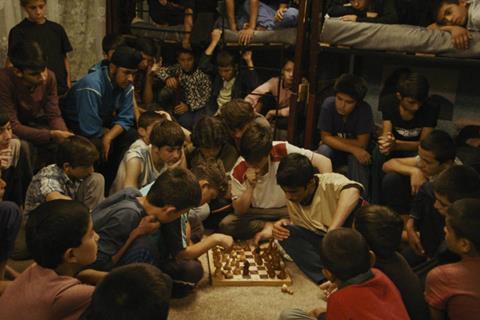A teenage boy in Afghanistan is sent to a Russian-run facility in this Bollywood-inspired follow-up to ’Wolf And Sheep’

Dir/scr. Shahrbanoo Sadat. Denmark/Germany/France/Luxembourg/Afghanistan/Qatar. 2019. 90 mins.
The Orphanage surveys war-torn Afghanistan through teenage eyes, assessing the daily impact of the country’s prolonged unrest. In her sophomore feature, Afghan writer/director Shahrbanoo Sadat combines the bleak reality of life during the civil war of 1989–1992, the daily routines weathered by anxious boys, and flights into Bollywood fantasy, crafting an empathetic and assured follow-up to 2016 Cannes Directors’ Fortnight Art Cinema Award-winner Wolf and Sheep which also continues to interrogate the feeling of being swept away by someone else’s struggle.
Bollywood-style dream sequences are likely to resonate with audiences
This similarly takes inspiration from unpublished memoirs by her friend Anwar Hashimi and is the second of a a planned series of five features. In tone and approach, though, it’s a different to its predecessor, with a more specific perspective and Bollywood-style dream sequences. While Afghanistan’s current plight is well-observed cinematically, stepping back to examine life on the ground three decades ago offers a rare but worthy viewpoint.
Filtering the experiences of 15-year-old Qodratollah (Wolf and Sheep’s Qodratollah Qadiri) through his love for Indian cinema might seem like an odd choice on paper, and yet it proves as smart as it is bold. As well as stretching Sadat’s directorial skills (she apes Bollywood’s look and feel with aplomb), the Urdu musical interludes give viewers an insight into her blank-faced protagonist’s emotional state. Indeed, the boy is at his most expressive when he’s glued to the big screen, his eyes feasting on every frame of 1988 vigilante picture Shahenshah in the film’s opening sequence. The joy radiating not only from Qodrat, but from the grown men also leaping to their feet, dancing and cheering around him, contrasts sharply with the mood that follows.
Outside of the Kabul theatre, Qodrat survives by selling homemade keyrings and scalping movie tickets, but when the police chase him down, he’s sent off to a Soviet-run facility for orphaned boys. One of five new arrivals, he pals around with 14-year-old Masihullah (Masihullah Feraji) and his 16-year-old nephew Fayez (Ahmad Fayaz Osmani) — a family relationship that the facility’s supervisor Anwar (Anwar Hashimi) instantly suspects.
Russian lessons, dorm-room power scuffles and a trip to the USSR all follow, and so do lusty teen chats, chess contests, altercations with bullies and World Cup excitement, painting a detailed picture of grim life in the orphanage as the years pass. As the Soviets withdraw from Afghanistan and the Mujahideen take over, news clips provide both the orphanage’s inhabitants and the film’s viewers with context, but the biggest political statements arise in the loose narrative’s ordinary moments. The teens yearn for a different existence, teachers tow whichever line is required by the current ruling regime, and the war’s unpleasantness ripples throughout the facility in both overt and quiet ways.
While Sadat’s first feature traversed sprawling hills and rural villages, The Orphanage favours stark walls and confined spaces. Tight framing gives it a palpable sense of tension and restriction. While the expressive fantasy sequences hit their marks, the film’s observational style suits the bulk of its story; roving camerawork, as lensed by Wolf And Sheep’s Virginie Surdej at a stand-in location in Tajikistan, conveys the restlessness simmering inside Qodrat and his new friends.
Production company: Adomeit Film
International sales: Luxbox, festivals@luxboxfilms.com
Producer: Katja Adomeit
Cinematography: Virginie Surdej
Editing: Alexandra Strauss
Main cast: Qodratollah Qadiri, Sediqa Rasuli, Masihullah Feraji, Hasibullah Rasooli, Ahmad Fayaz Osmani, Anwar Hashimi







![The Brightest SunScreen[Courtesy HKIFF]](https://d1nslcd7m2225b.cloudfront.net/Pictures/274x183/3/5/0/1448350_thebrightestsunscreencourtesyhkiff_312678.jpg)















![The Brightest SunScreen[Courtesy HKIFF]](https://d1nslcd7m2225b.cloudfront.net/Pictures/100x67/3/5/0/1448350_thebrightestsunscreencourtesyhkiff_312678.jpg)
